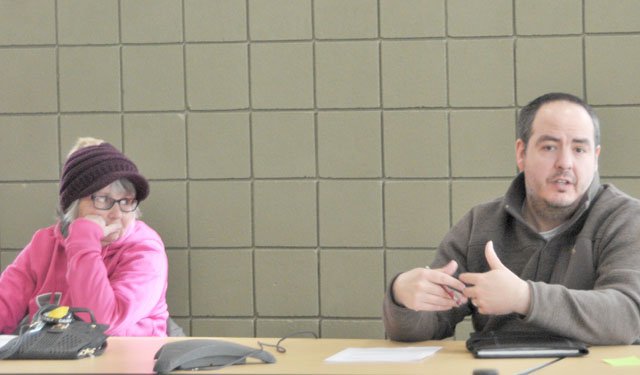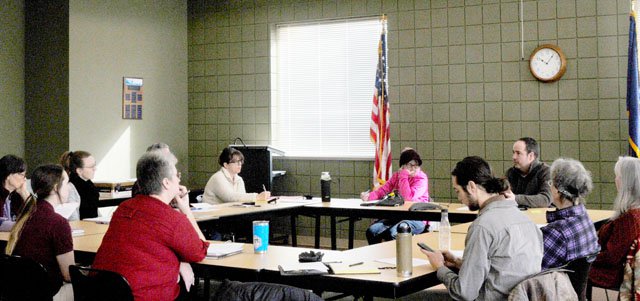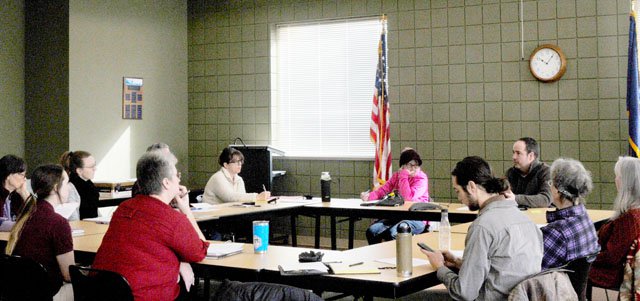CRAWFORD COUNTY - The Crawford County CAFO Study Group held its first meeting at the Crawford County Administration Building in Prairie du Chien on Wednesday, Feb. 19. The seven members of the study group gathered to discuss the scope of their activities, and what speakers might be invited to future meetings to educate the group. The next meeting of the group will take place on Thursday, March 12, at 10 a.m.
Members of the Study Group include Supervisor Dave Olson, member of the Land Conservation Committee, and Chairperson of the Study Group; County Conservationist Dave Troester; Jessica Spayde, Crawford County Community Development Agent; Public Health Officer Cindy Riniker; and county dairy producer Kim Moret, who is also a member of the Land Conservation Committee. The two citizen members of the group include Marietta Township resident/farmer Janet Widder, and Nikki Wagner, CAFO Nutrient Management Specialist with Frontier-Servco FS. Wagner is the individual that works with Roth Feeder Pigs on their nutrient management plans. Also present at the meeting were Edie Ehlert and Forest Jahnke of Crawford Stewardship Project.
Supervisor Dave Olson opened the meeting by clarifying what the role of the study group is and is not.
“We don’t have a quorum of the Land Conservation Committee at these study group meetings, so this group’s role is not to make decisions,” Olson said. “The job of this study group is to study what the impacts of CAFOs might be on the county’s health, safety and welfare, and to make a report.”

Kim Moret raised the question of what the future of the moratorium and the study group would be if the Livestock Facility Siting Law legislation proposed by State Senator Howard Marklein and State Representative Travis Tranel were passed, and signed into law by Governor Tony Evers.
“We have to proceed with the study group’s tasks until such time as the potential legislation is passed, signed, and goes into effect,” Riniker said.
“We will simply schedule our next meeting at the end of this one, and see where the legislation goes,” Olson said.
“Livestock facility siting is not the only topic that this study group can address,” Ehlert pointed out. “The group can also discuss the geology and soils of our county, the methods of manure spreading, and the impact that increasingly severe rainfall events are having on our water quality.”
Note: since this discussion, Wisconsin State Senator Howard Marklein made the following statement on Thursday, Feb. 20, when announcing that the proposed changes to the Livestock Facility Siting Law would not be taken up in this legislative session.
“My goal in crafting the livestock facility siting bill was always to support agriculture, while maintaining local control for local governments,” Marklein stated. “We worked hard, for months, to seek a balance between the needs of agriculture and the authority of local governments.
“Unfortunately, one of the stakeholders raised an issue that we could not overcome in time to complete the bill this session. The change they requested would have impacted local control and I was not willing to create an imbalance in this legislation. Our original proposal was a good bill that gave farmers certainty and predictability, while maintaining local control. This was my goal from the beginning of the process.
“I will continue to work with the farmers and the local government leaders I represent, along with the Department of Agriculture, Trade and Consumer Protection (DATCP), to find ways to work together for the strength and prosperity of agriculture in Wisconsin,” Marklein declared.
“Even though this bill will not move forward, I am extremely proud of our work on more than 40 other agriculture-related bills that I have been working on throughout the session. I am also proud of our work to build awareness and begin conversations about important topics in agriculture,” Marklein concluded.
Possible presenters
Perhaps, the bulk of the discussion at the Crawford County CAFO Study Group meeting was about what presenters could be invited to speak to the group, and on what topics.
Possible presenters for future meetings discussed by the group include:
• Janet Widder suggested inviting Dr. Kelvin Rodolfo to talk about karst geology and groundwater vulnerability
• Another suggestion was to invite Wisconsin State Geologist and Director of the Wisconsin Geological and Natural History Survey, Dr. Ken Bradbury. Bradbury has been involved in the SWIGG Study, and will be making a presentation on the latest research on regional groundwater quality, including the presence and transport of viruses and other contaminants in groundwater. His presentation will take place in Platteville on Sunday, March 8, from 5 to 6:30 p.m., at the Platteville Municipal Auditorium, 75 North Bronson Street
• Study group members were encouraged to consider attending the nutrient management education session, sponsored by the Crawford County Farm Bureau, on Thursday, Feb. 27, starting at 6 p.m., at Prairie du Chien’s High School’s Little Theater. The Farm Bureau will host a panel of farmers from the region that will be moderated by Amber Radatz of UW-Discovery Farms. Panel members will talk about their farming practices and their efforts to be good stewards of the land. Community members of the audience will be allowed to ask members of the panel questions.
• On the topic of the depth of soil to bedrock in Crawford County, it was suggested that someone from the U.S. Geological Survey might be able to present on this information. Fifteen counties in eastern Wisconsin were designated ‘Sensitive Areas’ by the Natural Resources Board, and it was established that depths of soil to bedrock of less than 20 feet over a fractured karst geology can make groundwater aquifers more vulnerable to contamination.
• It was suggested that the group could seek a presenter to educate them about the nitty gritty details of the various methods of manure distribution.
• The DNR wastewater specialist appointed to cover Crawford County is Claire O’Connell. She could educate the group about DNR regulations covering CAFOs, and the requirements for issuance of a WPDES permit. Another suggestion was Chris Clayton, formerly the CAFO Program Administrator with DATCP, who has worked for the DNR since November of 2019.
• Regarding DATCP and the CAFO Program, it was suggested that Jennifer Heaton-Amrhein, who travelled out to speak to the Marietta Township CAFO Study Group, might be willing to make a presentation.
• Kim Moret said that she would like the group to hear from AV Roth about his engineering plans for his proposed facility and its future economic impact on Crawford County. Janet Widder commented that if AV were to make a presentation to the committee, she would like to see him come with his plans for the proposed facility in Marietta Township.
• Dave Troester said that USDA-Natural Resource Conservation Service District Conservationist for Crawford County, Karyl Fritsche, could present to the group about NRCS standards for manure storage facilities.
“Marietta Township should adopt zoning and not push their problems off onto the county,” Kim Moret said. “I don’t see why this needs to be a county problem.”
• Mississippi River Regional Planning Commission’s Senior Planner, Bob Gollnik, was suggested as someone who could present to the group about zoning.
Troester pointed to the history with frac sand mining in the county. He said that the county had formed a study group, and that group had developed a sample ordinance for use by the townships.
Crawford Stewardship’s Edie Ehlert pointed out that adopting zoning can help, but could not be used to deny a CAFO permit.
“Even if a town or county adopts zoning, they have to designate a portion of the land zoned agricultural where a CAFO would be allowed to operate,” Ehlert explained. “Towns and counties have been reluctant to be in the position of having to choose whieh citizens to sacrifice to living near a CAFO.”




